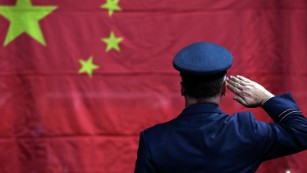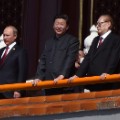China flexes muscles with World War II military extravaganza
Some 12,000 troops marched through the Chinese capital Thursday morning with fighter jets flying overhead as China put on a massive display of military might in a parade to mark the 70th anniversary of the end of World War II.
Presiding over the extravaganza, Xi, the country's most powerful leader in decades, said that China would remain committed to "the path of peaceful development" and unexpectedly pledged to cut 300,000 troops from its 2.3-million strong military.
The massive parade was the first since he came to power in 2012 -- but it was largely shunned by Western leaders, including China's former wartime allies, the United States and UK.
Russian President Vladimir Putin, President Park Geun-hye of South Korea and United Nations Secretary-General Ban Ki Moon were the highest-profile dignitaries to take their seats on a podium in Tiananmen Square, in the ancient heart of Beijing.
Xi, standing up in a black Red Flag limousine, drove past and greeted troops stood in neat formation along Chang'an Avenue before the parade began in earnest.
Hundreds of ballistic missiles, tanks, amphibious assault vehicles, drones and other military equipment were paraded past the gathered leaders, veterans and guests.
To cap the celebration, some 200 fighter jets took to the skies before hundreds of doves and balloons were released above Tiananmen Square.
Among the 12,000 troops were contingents from Russia, Pakistan and 15 other countries.
Yvonne Chiu, assistant professor of politics at the University of Hong Kong, said that Xi's pledge to cut troop numbers was relatively insignificant given that country's military budget would likely continue to rise at a double-digit pace.
"China's military is huge. It's an easy gesture for him to make."

How big is China's military?
No effort was spared to ensure the landmark event proceeded without a hitch.
Hundreds of factories were shut to ensure crystal blue skies, flights in and out of Beijing have been canceled for the parade's duration and, just to ensure that the city's airspace is safe, monkeys, falcons and dogs have been deployed to scare away birds.
High stakes
Commonplace under Chairman Mao Zedong, China has held fewer showpiece parades in recent decades.
The last was for the 60th anniversary of the founding of the People's Republic of China in 2009 under the watch of former President Hu Jintao.
For Xi, the stakes are high. The victory parade allows him to project his power, both domestically, and in a region where many countries are wary of China's ambitions, says Tate Nurkin, a defense and aerospace analyst at research firm IHS.
U.S. allies in Asia, like Japan and Taiwan, will be paying close attention to the military hardware on display, particularly ballistic missile technology.
In Washington, it gave military watchers a chance to check out China's homegrown defense industry and how it may go about pursuing territorial claims in the South China Sea.
At home, the parade has allowed Xi to distract from turmoil in the financial markets and a massive industrial explosion in Tianjin that killed more than 150 people.
In the background are rising social tensions and ethnic unrest in parts of the country, as economic growth slows and the income gap widens.
Virtual prisoners
And while Chinese are enjoying a three-day public holiday as part of the celebrations, many Beijing residents weren't be able to see the parade themselves.
Those living within the lockdown area were virtual prisoners for the parade's duration: They weren't permitted to leave their homes, invite guests, use balconies or even open windows.
"I definitely feel proud of my country, that it's showcasing the victory and prosperity," said Zhang Zhijun, a business researcher, who had to leave work at noon because of the lockdown.
"But there was no explanation or negotiation with Beijing residents about all the hassles the parade has caused."
And good luck to anyone wanting to tune out the pomp and pageantry.
Broadcasters are prohibited from airing any entertainment programs, half of Beijing's five million registered cars are banned from streets and many of the city's parks and tourist attractions are shuttered.
High stakes
One leader whose absence was never in doubt was Japanese Prime Minister Shinzo Abe.
The Japanese leader's failure to offer a new apology for Japan's brutal invasion and occupation of much of China in the 1930s and 1940s has prompted new denouncements from Beijing.
The state-run Xinhua news agency demanded the Japanese emperor, a revered figurehead, to apologize for his nation's wartime atrocities, triggering protests from Japanese officials -- though 81-year-old Emperor Akihito recently expressed his "utmost grief" for the suffering Japan inflicted in the war.
While China has said that the victory parade didn'tt target Japan, it's clear that anti-Japanese sentiment underpins the celebrations.
"The Japanese militarist invaders were extremely bloody and cruel, who treated the Chinese people with unprecedented brutality, and tried to use massacres and death to get the Chinese people to yield," Xi said on Wednesday at a ceremony to present medals to veterans, according to Xinhua news agency.
News Courtesy: www.cnn.com











